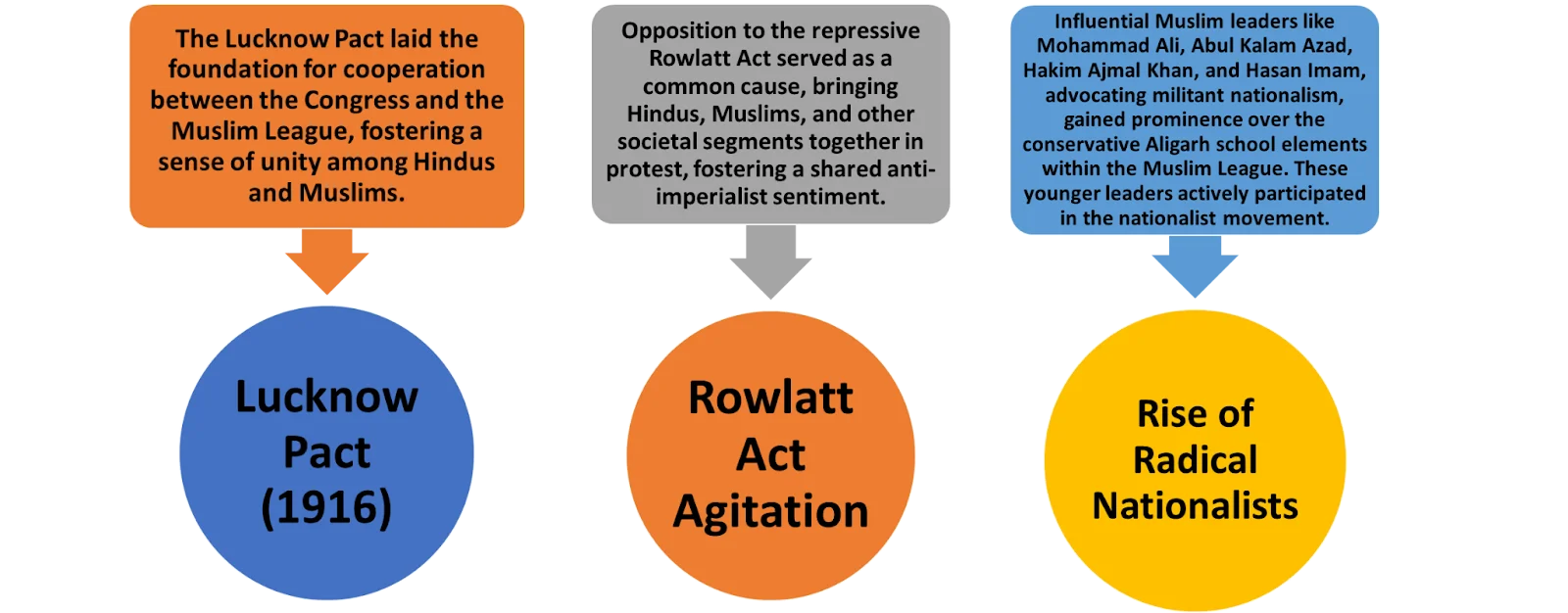The Rowlatt Act, the Jallianwala Bagh massacre, and the imposition of martial law in Punjab shattered the generous wartime promises made by the British. The disillusionment deepened among Indian Muslims, who, realizing that promises of favorable treatment for Turkey after the War were mere manipulations, grew resentful. Between 1919 and 1922, the British faced opposition through two concurrent mass movements—the Khilafat and Non-Cooperation. While these movements originated from distinct issues, they embraced a shared strategy of nonviolent non-cooperation. Although the Khilafat issue was not directly tied to Indian politics, it served as the immediate backdrop for the movement and offered the additional advantage of fostering Hindu-Muslim unity in opposition to British rule.
Background
As the last year of the second decade of the twentieth century unfolded, India found itself steeped in discontent, and with valid reasons.

- Economic Conditions: Alarming economic conditions post-war, marked by rising commodity prices, decreased industrial production, and increased tax and rent burdens, inflicted hardship across society, fostering anti-British sentiments.
- Repressive Measures: The Rowlatt Act, martial law imposition in Punjab, and the Jallianwala Bagh massacre revealed the brutal and uncivilized nature of foreign rule, intensifying anti-British sentiments.
- Flawed Inquiry: The Hunter Committee, tasked with investigating Punjab atrocities, proved to be a mere eyewash. The House of Lords endorsed General Dyer’s actions, and public support, exemplified by The Morning Post’s fund collection of 30,000 pounds for him, underscored British solidarity.
- Inadequate Reforms: The Montagu-Chelmsford Reforms, introduced in late 1919, featuring a flawed dyarchy scheme, failed to meet Indian demands for self-government, deepening dissatisfaction and prompting a quest for more meaningful reforms.
Enroll now for UPSC Online Course
By the end of the first quarter of 1920, the justifications for British rule in India were rapidly diminishing. In the aftermath of the First World War, the stage was set for unified political action among Hindus and Muslims, driven by various factors such as the Lucknow Pact of 1916, the Rowlatt Act Agitation, and the Rise of Radical Nationalists.

The Khilafat Issue
The Khilafat issue played a pivotal role in fostering a radical nationalist sentiment among the younger generation of Muslims and traditional scholars critical of British rule. Their discontent stemmed from the mistreatment of Turkey by the British post-World War I. Muslims globally, considering the Sultan of Turkey as their religious head (Khalifa), were deeply upset by Turkey’s dismemberment and the removal of the Khalifa from power.
In India, Muslims united in demanding:
- Retention of Khalifa’s control over Muslim sacred places.
- Adequate territories for the Khalifa after territorial arrangements.
In early 1919, the Ali brothers (Shaukat Ali and Muhammad Ali), Maulana Azad, Ajmal Khan, and Hasrat Mohani formed the Khilafat Committee, aiming to compel the British government to reconsider its stance on Turkey. This laid the foundation for a nationwide agitation.
Development of the Khalifat-Non-Cooperation Programme
Shift in Approach: Initially, Khilafat leaders focused on peaceful actions such as meetings, petitions, and deputations advocating for the Khilafat cause. Over time, a more militant approach gained prominence, calling for an active agitation that involved ceasing all cooperation with the British.
- This shift was evident at the All India Khilafat Conference in Delhi in November 1919, where a boycott of British goods was endorsed.
- Gandhi’s View: The Khilafat leaders explicitly stated that if the post-war peace terms were not favorable to Turkey, they would cease all cooperation with the Government.
-
- Gandhi, serving as the president of the All India Khilafat Committee, recognized the potential of the issue as a platform for declaring mass and united non-cooperation against the Government.
Congress’s Stand on the Khilafat Question and Muslim League Support
Congress Stand: The Congress’s stance on the Khilafat question was crucial for the success of the movement. While Gandhi advocated satyagraha and non-cooperation on the Khilafat issue, the Congress was initially divided on this form of political action.
- Tilak Stand: Tilak opposed forming an alliance with Muslim leaders over a religious matter and questioned the efficacy of satyagraha in politics.
- Gandhi’s Stand: Despite opposition, Gandhi worked to persuade Tilak and others of the benefits of satyagraha and the alliance with the Muslim community on the Khilafat issue.
- Eventually, Gandhi secured Congress’s approval for his non-cooperation program, including support for the Khilafat question.
The Congress leaned towards endorsing a non-cooperation program on the Khilafat issue because of the reasons listed below:
- Scope of Mass Movement: It was perceived as a golden opportunity to foster Hindu-Muslim unity and involve Muslim masses in the national movement. Various segments of society—Hindus, Muslims, Sikhs, Christians, peasants, artisans, capitalists, tribals, women, and students—could join the movement by advocating for their rights, and realizing the opposition of colonial rule to their interests.
- Also, the awareness that the masses were eager to express their discontent contributed to the Congress’s inclination towards supporting a non-cooperation program on the Khilafat question.
Enroll now for UPSC Online Course
- League’s Support: Simultaneously, the Muslim League pledged full support to the Congress and its political agitation.
- Ineffectiveness of Petitions: The Congress’s diminishing faith in constitutional struggle, particularly after the Punjab incidents and the blatantly biased Hunter Committee Report, played a significant role in the decision.
| Must Read | |
| Current Affairs | Editorial Analysis |
| Upsc Notes | Upsc Blogs |
| NCERT Notes | Free Main Answer Writing |
Conclusion
The Khilafat Movement represented a pivotal moment in India’s fight against British domination, bringing together Hindus and Muslims in a joint quest for equality. Even though they had different beginnings, the Khilafat and Non-Cooperation movements showcased the effectiveness of united nonviolent opposition. The general unhappiness with British actions and their inability to address Indian complaints encouraged these movements, paving the way for a larger, unified struggle for independence.
Sign up for the PWOnlyIAS Online Course by Physics Wallah and start your journey to IAS success today!

 GS Foundation
GS Foundation Optional Course
Optional Course Combo Courses
Combo Courses Degree Program
Degree Program









